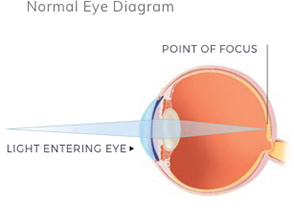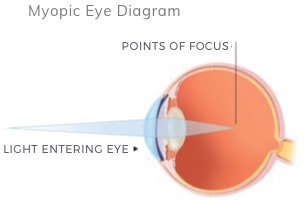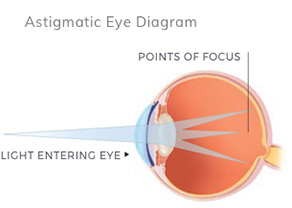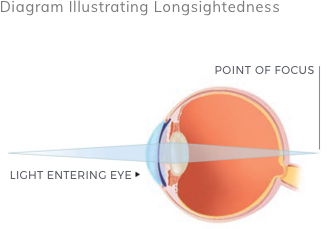If you’re intrigued by the prospect of laser eye surgery, you’re not alone. Each year, thousands of people opt for this life-changing procedure to enhance their vision and reduce their reliance on glasses or contact lenses.
But how does laser eye surgery work? Let’s take a closer look at this technology.
Looking for something specific? Browse here:
An Overview of Laser Eye Surgery
Corneal refractive surgery, colloquially known as Laser Eye Surgery, involves using a precise laser system to reshape the front, clear window of the eye — the cornea. Although these alterations occur on a microscopic scale, they enable us to modify the eye’s focus, refining the images sent to your brain for visual processing.
If you think of the eye like a camera, the focusing system may not always produce a sharp, clear image on the retina located at the back of the eye. This can be attributed to conditions like myopia (short sightedness), hyperopia (long sightedness), astigmatism (blurry vision), or presbyopia (age-related long sightedness).
The visual effects of each condition is illustrated below:




To delve into how Laser Eye Surgery works to correct these vision issues, let’s begin with a brief overview of corneal anatomy.
What is the Anatomy of the Cornea?
As the clear, protective dome covering the front of your eye, the cornea plays a pivotal role in your vision.
It behaves like a lens, with your unique corneal shape responsible for bending and focusing the light that enters your eye. It consists of several layers, each with a unique purpose:
1) Epithelium
The outermost layer acts as a shield, protecting the cornea from foreign particles and infection.
2) Bowman’s Layer
Beneath the epithelium, this layer provides structural support to the cornea.
3) Stroma*
The middle and thickest layer, primarily made up of collagen fibers, grants the cornea its strength, clarity, and shape. *The curvature change done by the laser to adjust prescription happens here.
4) Descemet’s Membrane
Found beneath the stroma, this layer acts as a protective barrier and helps maintain the cornea’s shape.
5) Endothelium
The innermost layer pumps excess fluid out of the stroma, ensuring the cornea remains clear and transparent.
As we explore the intricacies of this fascinating structure, you’ll gain a deeper appreciation for the transformative potential of Laser Eye Surgery.
Our next section delves into the specifics of how the laser works to permanently reshape the cornea to improve your vision.
How Laser Eye Surgery Works to Reshape the Cornea
1) Digital Mapping
Before the surgery, your ophthalmologist creates a detailed map of your cornea using advanced digital imaging.
This map pinpoints the exact areas that need adjustment. Read the section below to know more about this crucial first step.
2) Exposing the Stroma
In both LASIK and other surface treatments, the outermost layer of the cornea (the epithelium) is prepared by the surgeon to grant access to the deeper stroma of your cornea.
This important step sets the stage to achieve a precise corneal shape.
3) Corneal Reshaping
With utmost precision, a cool laser beam is used to sculpt the stroma, eliminating minuscule amounts of tissue. This reshaping ensures that incoming light is correctly focused.
The WaveLight laser system does this with exceptional accuracy.
4) Recovery
Once the cornea is reshaped, the flap is carefully repositioned.
Since the cornea heals naturally, there is typically no need for stitches, only a bandage contact lens for 4-6 days. Patients typically see very clearly before this healing period ends.
Personalised Vision Correction: Beyond Conventional Treatments
How the treatment is delivered can vary, most commonly either using a flap (LASIK) or some form of surface treatment (LASEK, PRK, Trans-PRK, epi-LASIK, Trans-Epi). Some laser systems can also use ReLEx® SMILE which can be described as a “key-hole” approach.
There are a number of ways in which the nuances of the human eye can be measured. Each of these measurements can be used to drive additional customisation to the above for the best visual outcome – such as , WaveFront, Topography Guided (T-CAT) and combined Corneal Cross-linking treatments.
Each of these treatments has its advantages and disadvantages and will be better suited to some eyes than others.
WaveLight and Corneal Topography
The result of this process is a reshaped cornea that can now effectively focus light onto your retina, leading to clear, natural vision.
At our clinic, we harness the power of the WaveLight laser, guided by a sophisticated mapping system. This cutting-edge system generates a comprehensive topography (like a detailed 3D map) of your cornea.
Leveraging decades of clinical insights, we then orchestrate the WaveLight laser’s microscopic precision, directing it precisely to your specific visual needs.
One of the standout advantages of topography-guided laser eye surgery is its ability to deliver lasting clarity. The changes made to the corneal shape are permanent and exact, offering an effective solution to your vision concerns.
Common Laser Eye Surgery Misconceptions
To empower you with accurate information, let’s first distinguish fact from fiction as we dispel these common misconceptions:
- Pain Concerns: Laser Eye Surgery is virtually painless, with most patients reporting only minor discomfort during the recovery period.
- Immediate Results: While most experience improved vision right away, the full range of your visual clarity can take a few weeks to show.
- Limited Vision Correction: Laser Eye Surgery can treat myopia, hyperopia, astigmatism, and presbyopia, making it a versatile solution for a wide range of vision issues.
- Short-Lived Results: The corneal reshaping achieved during the procedure is permanent for most patients, offering long-lasting vision improvement.
- High Risk of Complications: Serious complications are rare, especially when performed by experienced surgeons in a reputable clinic.
- Inconvenient Recovery: Recovery is often quick and relatively hassle-free, with most patients resuming normal activities within a day or two.
By addressing these misconceptions, we aim to provide you with a clear and accurate understanding of what to expect from Laser Eye Surgery.
Crucial Dos and Don'ts — Preparation and Aftercare
Here’s a crucial breakdown of Laser Eye Surgery before and after, including what to expect in the post-Laser Eye Surgery recovery phase and insights on how to maximise your newfound clarity for years to come.
Do:
1) Follow Pre-Operative Instructions
Your surgeon will provide you with detailed pre-operative instructions. These may include guidelines on when to stop wearing contact lenses, what medications to avoid, and when to stop eating and drinking before the surgery. Adhering to these instructions is crucial.
2) Arrange Transportation
You won’t be able to drive yourself home after the surgery. Arrange for a trusted friend or family member to drive you to and from the clinic on the day of the procedure.
3) Stock Up on Essentials
Prepare for your post-surgery recovery by stocking up on essential items like preservative-free artificial tears, a comfortable eye mask, and any prescribed medications. Having these on hand will make your recovery more comfortable.
4) Plan Time Off
It’s advisable to take a few days off work or other obligations to ensure you have sufficient time to rest and heal after Laser Eye Surgery.
5) Ask Questions
If you have any concerns or questions about the procedure, don’t hesitate to ask your surgeon during your pre-operative consultation. Being well-informed will help alleviate any anxiety.
Don’t:
1) Wear Contact Lenses
It’s typically recommended to discontinue the use of contact lenses for a specific period before Laser Eye Surgery. Soft lenses should be discontinued for at least a few days, while rigid gas permeable lenses may require several weeks to be removed from the eye.
2) Wear Eye Makeup
Avoid using eye makeup, lotions, and creams on the day of the surgery. These products can increase the risk of infection.
3) Eat or Drink Before Surgery
Follow your surgeon’s fasting instructions carefully. Typically, you’ll be required to abstain from eating or drinking for several hours before the procedure. This is to ensure your stomach is empty, reducing the risk of complications during the surgery.
4) Neglect Post-Operative Care
Laser Eye Surgery isn’t just about the procedure itself; it’s also about what comes after. Neglecting post-operative care instructions, such as using prescribed eye drops or attending follow-up appointments, can hinder your recovery and limit your newfound visual potential.
5) Overexert Yourself
After Laser Eye Surgery, it’s essential to take it easy. Avoid strenuous activities, heavy lifting, and exercises that could strain your eyes during the initial recovery period.
By following these dos and don’ts before and after Laser Eye Surgery, you’ll be better prepared for the procedure and maximise your chances of achieving the best possible vision for many years to come.
Remember that careful preparation and post-operative care play a significant role in your journey to clear and crisp vision. Treat your eyes with the care they deserve.
The AccuVision Approach to Consultation

Your eyes are not a commodity, so try not to think of Laser Eye Surgery as a shopping expedition. Many clinics will offer you the choice of different treatments, each at a different price. They may tell you that you can have the bronze, the silver or even the gold treatment! We talk to so many patients who are left feeling baffled with the choices that they are given. Surely with something as precious as your eyesight, only the best will do!
At your consultation we will guide you on which treatment option will be the safest and most effective for your eyes.
When you first enquire with AccuVision about Laser Eye Surgery, we will discuss with you some basics about your vision and requirements, and guide you to the appropriate type of consultation for your needs. You can complete a contact request here or call us on 0330 123 2020.
What to Expect At Your Consultation
A consultation for Laser Eye Surgery at AccuVision is the first step on your journey to better vision. At the time of booking for the appointment, you will receive details on how to prepare and what to expect.
The appointment usually requires you to invest an hour of your time in the clinic with us. Our experienced multidisciplinary clinical team including Optometrists and Ophthalmologists will help you understand your vision problems, suitability for laser surgery and details of options and expectations.
While some of the tests may be similar to ones you have had before, your diagnostic evaluation will involve in depth analysis of your vision and eyes, likely more comprehensive than any eye exam you have had before. You can read about our technology here.
- No pressure.
- No upsell of treatments.
- No sales and marketing teams on commissions to book you in.
- No marketing calls pushing you to sign up for surgery.
What Happens Next?
Depending on your treatment plan, you will be given information on how to prepare and book for surgery. Details on prices for your laser treatment and payment options will also be explained.
If necessary, you may be advised of the need for further appointments for additional or repeated scans, or specific non-standard tests prior to proceeding with treatment. You are also welcome to re-attend for further consultation with your treating surgeon prior to the day of surgery, with no obligation to proceed. The Royal College of Ophthalmologists recommends a 7 day cooling off period between this consultation and your planned treatment.
AccuVision has always operated a “no quibble” policy. If for any reason you decide you no longer wish to proceed, even on your scheduled day of treatment, our team will accommodate your needs and provide a full refund as per our terms.
Frequently Asked Questions
Laser Eye Surgery for short-sightedness, or myopia, involves reshaping the cornea using a precise laser. The laser removes microscopic amounts of corneal tissue, allowing the cornea to focus light more accurately on the retina. This corrects the refractive error, enabling clear vision without the need for glasses or contact lenses.
Laser surgery for glaucoma typically involves two procedures: laser trabeculoplasty or laser iridotomy.
Laser Trabeculoplasty: This treatment aims to enhance the drainage system inside the eye, which is crucial for maintaining normal eye pressure. By using a special laser, doctors help open up the drainage channels, allowing the fluid inside the eye (called aqueous humor) to flow out more efficiently. This, in turn, reduces the pressure inside the eye, which is essential for managing glaucoma.
Laser Iridotomy: In this procedure, a small hole is created in the colored part of the eye called the iris. This hole acts like a relief valve, allowing excess fluid to drain out of the eye more easily. By improving fluid flow and decreasing eye pressure, laser iridotomy helps manage glaucoma effectively.
Laser-assisted cataract surgery uses a laser to create precise incisions and soften the cataract before removal. The laser’s precision minimises manual manipulation during surgery, leading to faster recovery and reduced risk of complications.
Laser Eye Surgery is typically not painful. Patients may experience minor discomfort or a burning sensation during the procedure, but anaesthesia and numbing eye drops are used to ensure comfort. Most discomfort subsides shortly after the surgery.
Yes, Laser Eye Surgery offers a permanent solution for vision correction. The reshaping of the cornea is lasting, and the majority of patients enjoy improved vision for the long term. However, vision changes due to aging (presbyopia) may require additional treatment later in life.
Laser Eye Surgery involves several key steps:
a. Pre-operative evaluation to assess candidacy.
b. Administration of numbing eye drops.
c. Creation of a corneal flap or removal of the outer corneal layer.
d. Precise laser reshaping of the cornea.
e. Repositioning of the corneal flap or healing of the outer layer.
f. Post-operative care and follow-up appointments.
Laser Eye Surgery is a safe and effective option for many individuals seeking vision correction. However, its suitability depends on individual factors and the type of vision problem. Only a comprehensive consultation with an eye care professional can determine if laser eye surgery is right for you.